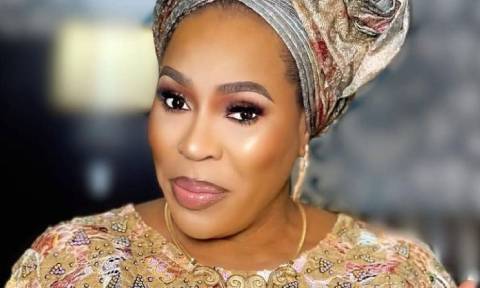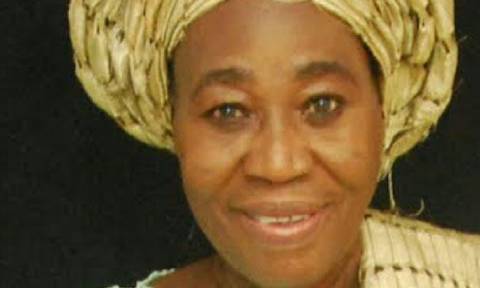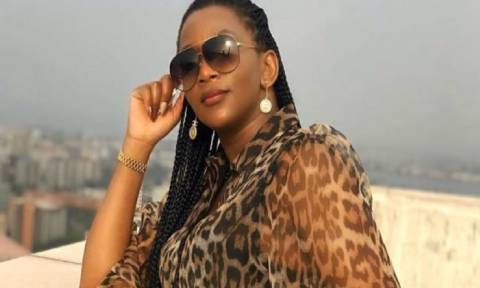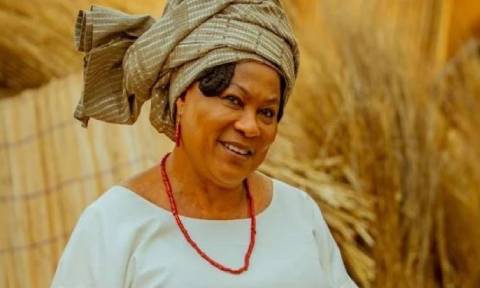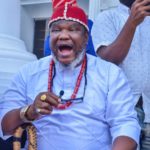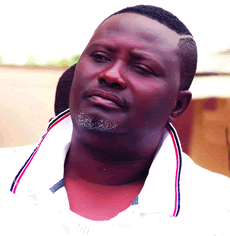
Ace actor, film director and producer, Antar Laniyan, has sensationally revealed that his mother carried the pregnancy that produced him for 18 months due to spiritual manipulation.
The actor, who was recently nominated as one of the best four actors in Africa, also told us that he would have become a soldier. He also spoke on other personal issues.
Many Nigerians know you for your acting prowess, but not many know your history. Could you tell us a bit of yourself?
I am from Osogbo, in Osun State. The name, Antar, is Yoruba; it has to do with the story of my birth; that is why it’s unique; that’s why you hardly can or you may not find another person bearing that name. So, it has to do with the story of my birth. I overstayed in my mother’s womb. I stayed 18 months. At that time, there was this fear that my mother would die with the baby in her womb; so she had to run all over the place to seek help. During her sojourn, she met a great herbalist that revealed what was the cause of the abnormal delay. She found out that someone was behind it. An animal called iguana, which is awonriwon or Antar in Yoruba, had to be used. It ‘s bigger than lizard. It was added to some salt and a concoction was made for my mother to take. A few hours after she took it, she went into labour. On her way to the hospital, I came on. She didn’t, therefore, see anything wrong in naming me after the animal.
Is there any other name she calls you apart from that?
She calls me Babatunde and others, but she prefers that name to others. She preferred it. She said that as far as she was concerned I am Antar. (laughs)
When did you start acting?
My earlier stage acting was in 1976; it’s a long time now. However, I became a professional, under Ben Tomoloju, in 1980, June 18, 1980 precisely. It’s about 31 years today and am not 50 yet (laughs).
That means you started when you were just a boy?
Yes, I started early. My parents are dead now. My dad was enthusiastic about my acting career that he once nicknamed me Antar the Sango, on seeing my picture as Sango, in a stage play. He even took the picture to his office. I just showed him the picture and he collected it. I didn’t know that he would take it to the office. You know, he was so proud of me that he wanted everybody to see it. There was no television to show our performance then. My daddy was an educationist; he was working with the ministry of education; so he just took it to the office. When he returned it he had written, ‘Antar D Sango;’ yeah he wrote it there.
Can you remember your first payment as an actor?
I can’t remember. In any case, I remember RMD (Richard Mofe-Damijo) asking when were going to earn our first N1, 000. I remember that we where under the tree at the National Arts Theatre discussing and wondering when we were going to earn our first N1, 000. There was no money then; nobody was paying. Who would pay you that time? Nobody was paying anybody. Around 1976, I was less than 15. I was a small boy. I was a small boy running away from home, to help people carry props, in production stage. I used to abandon my mother’s wares to help them carry drums.
During FESTAC 1977, though, a small boy, I went to the theatre to watch a play I was really passionate about, but they did not allow me to enter because I could not afford the gate fee. I talked to a woman, who was a cleaner. I collected a drum and broom from the woman and helped her to sweep Hall 2 of the theatre. I will never forget that day. After the sweeping and everything, the woman said I should stay behind while tickets were being sold. So the audience came in and I just sat down on the rug there and I saw the performance live; that was 1977. I was desperate, my brother. I saw the promo on television. I saw their dance and all that. Everybody was talking about FESTAC 77, it was like an anthem. I was fascinated with the euphoria in the air. That was why I made up my mind to watch it, against any odd.
Could you tell us about your growing up?
I started very early in life, as I said earlier. I started when I didn’t know where I was going. At that time, I didn’t know what I wanted to do. I just saw myself around Ijora attending rehearsals with some elderly people. That was around 1976 or so. I was very small. I was a small boy, just one young boy moving around with other people. I was helping them to pack their stage props; some of the things were local drums, like Gangan, their gongs and Shekere, among others. They were also sending me on errands. I just saw myself following them all over the place. I was in my lower class, in secondary school. While I was in the secondary school, I didn’t see anything wrong in joining dramatic class, because primarily, I had thought that after my secondary school I would join the army; that was what I wanted to do. I loved the military. I still love them.
During my secondary school lower class, I used to represent my school in inter-school competitions; I mean drama competitions and we won laurels. Our seniors in school then, used to tell the principal that if not for Antar, we wouldn’t have won anything and all that. So when I was eventually made the president of the dramatic society in the secondary school, because of my contributions and activities, we were still wining laurels for the school. One day, my school principal, Chief M. O Alake, who was the father of present Alake, called me to his office and told me that he saw me excelling more in drama than any other thing in life. I don’t know why the man did that; he just asked: ‘Antar after your secondary school, what will your course be?’ I told him that I wanted to be a soldier. He laughed and said he would advise that I go into dramatic arts or theatre arts or anything like that. I told him that I can’t be, but he said he saw what I was doing during rehearsals and have seen the laurels we won and concluded that I would do well in acting.
He didn’t live to see what I have become because he died not long after that. I remember that I started appearing in the newspapers for first time in 1981 when I was with Ben Tomoloju’ Kakaaki. In 1979, we started Kakaaki performance and we started doing professional films in 1980. As at 1980, we were already on the pages of The Punch newspapers and there was this evening paper around that time too. Indeed, a year after leaving secondary school, I had started appearing in newspapers. It was like an encouragement.
After my HSC, I still wanted to be a soldier, but when I remembered the principal’s advice and also considered the fact that then, I had become popular in the town, as people recognise me in the streets, saying: Ah, that’s the boy actor. You see, I was a small boy but I was being recognised. There were not many artistes at that time, so it was easy for people to identify me. I decided to give full time acting a trial. There was this pressure from Ben Tomoloju too. He was always urging me to read theatre because he had gone to Ibadan to study Theatre Arts too.
Eventually, I succumbed to the pressure and enrolled for Theatre Arts at the University of Ibadan, Oyo State. When I got in there, I saw theatre in its quintessential nature.
Why did you nurse the dream of becoming a soldier initially?
As a small boy, I lived in the barracks. I once lived in the barracks with my mother. It was 202 Battalion at Ilaran. My mother was the chief mammy market woman. She started the market, so she was made the chief of that market and we were going to the barracks everyday to sell food. I was always a witness to the parade in the morning, parade in the afternoon and I fell in love with the uniform and I vowed that one day, I would wear the shining khaki uniform. Besides the uniforms, I loved the discipline being instilled in the soldiers in the barracks. It rubbed off on me, as that discipline is still in me till today. As a director and actor, it comes handy. I am always conscious of punctuality in my productions.
How was life in the barracks?
My life in the army barrack then was like six hours everyday because we were going there everyday. We were going there to sell. We close from school and go to meet mama in the market. I witnessed the discipline, as I said earlier. I knew about the guard room punishment, the hard looks of soldiers, the salute patterns and their ruggedness, among others. And I really loved them. What I think I gained from the barracks is discipline. The experience has instilled that discipline in me, such that now I usually realise that when you go to locations, it’s like you are going to a war front; you must go there and fight a war that you must win; you are not going to location to wine and dine. You only take a few minutes out to eat and go back to set. In fact, if you think you are coming to wine and dine at location, waste time around and play with the girls, you must be joking. With Antar as director, you can’t do that.
How was your parents’ reaction when you eventually opted for the stage?
When I chose the theatre, my mother was happy. A good mother she was. In any case, she didn’t want to have a soldier son. Therefore, when she saw the photographs of rehearsals of plays, she was happier that I wasn’t going to end up as a soldier after all. Even my daddy was enthusiastic about my choice of theatre. He even nicknamed me Antar de Sango, owing to a role I once played in a Yoruba epic.
So, when you got to Ibadan, how was your experience?
Once I got there, I saw people like me, those with whom I have been practicing outside, like Tunji Sotimirin, Shola Wasiu, and others. So we just continued like that and it was interesting. It was okay and very gratifying. I felt very happy, though there was no money.
What was your experience reading theatre Art at Ibadan?
Reading theatre Art at Ibadan was very challenging. Acting, especially, was highly challenging. You just have to do it and do it very well. If you don’t do it, you won’t leave the school (laughs). I remember Moremi, a play by Prof. Femi Osofisan. I remember it vividly. You have to memorise the lines, however long; if you missed the lines you missed that character, you missed the trace, because, the characters were like poets, and their lines were like poems and you had to render them the way they are. It was like when you are doing an Elizabethan play. You have to be in character and render those lines the way the way so that the white man there would understand. That was so challenging, very different from what we were doing outside then and nowadays. All our lecturers, in various capacities, were always present to watch the performances: the speech woman and acting teachers will be there and so will the directing teacher. They would all sit down there in the auditorium and watch you demonstrate what they had taught you; they wanted to see you make use of what they had taught you.
So you really have to be there. I found that very challenging.
Credit goes to Ben Tomoloju. He trained me from the scratch. I was already molded before I got into the university, but then the training in the university was the real thing; practical theatre thing was a departmental requirement. However, I give credit to Ben Tomoloju for picking me raw, discovering the talents and bringing the artiste out of me. People like Bayo Odunneye, Prof. Dapo Adelugba, Dr. Femi Fatoba and the rest of them, who also helped me, but on his efforts. Then, you cannot meet those giants and not make it. Plays like Murder in the Cathedral, Moremi, The Man who never Died, in which I played major roles, contributed, in no small measure, to make me and I thank God that I trained at the University of Ibadan.
We learnt that you were a radio presenter when you were in the university
While I was in the university I was still practising. There was no money. I was going to school on Monday morning and return to Lagos to make money, by Friday evening. My weekend was spent in radio Nigeria; that was where my voice and my speech were polished. There was opportunity in the station then, for radio drama and if you were not good in oral English, they won’t allow you; Radio Nigeria would not allow you to stand in front of microphone. So I had to attend their training school, for speech training and the rest of them. Even after school, I was still doing it, just to get myself polished.
How did Ben Tomoloju discover you?
Well, let me tell you that Ben Tomoloju picked me from secondary school. He was a teacher and he was one of those that judged who won what, among schools competing in drama then. This was because he was in charge of his own school too. Let me tell you how it started. During one of those competition, he asked me to see him the following Saturday at Saka Tinubu Memorial High School. When I got there, he told me that he wanted me, him and two other young men to start a drama group called Kakaaki Art. So after completing my secondary school, I started with him and we were meeting every Saturday. He wanted to know everyone’s area of specialisation. If you were a singer, then you sing, and if an actor, you act. Within a year, we had increased to over 60, 60 young men under Ben Tomoloju and we were in him media. We opened NTA Channel 7 in 1981; it’s the former Channel 7 that is now Channel 10.
Tomoloju was writing plays, we were acting. He also encouraged some of us to write and they were produced. The Revenge, which I wrote, was first produced when I was with Tomoloju. Tunji Sotiminri, my colleague, who he was working with LTV, then also, wrote plays for Kakaaki. Being part of Kakaaki drama group was really rewarding. We are still on and together, some how, although, everybody has gone to other places; some are abroad. Jahman Anikulapo is now Saturday editor of The Guardian. Tunji is lecturing at the Department of Theatre Arts, University of Lagos and all that. I am here, but I know that if anything big is happening, we will meet, link up with one another instantly and head for Tomoloju’s house.
What drives you in the profession?
Discipline, hard work and knowing that whatever praise you have now, whatever anybody is saying about you, is a product of what you have done. In any case, you don’t rely on the praises, because that same tongue can also say you are falling. So when they say you are good, you keep working. I still stand in front of the mirror to see if there is still an actor in me. You see that mirror there (in his office) is not for nothing; if you go now and I’m less busy, I close the door, I act and see myself in the mirror, to know if I am still an actor. I still rehearse. I still practice. I still read drama books, directing books. They are all here. I don’t praise myself. When I see other giants in the industry, I ask myself what these people are doing that I don’t know. I learn from them.
Are you fulfilled now that you are rated among the four best actors in Africa?
I think I will be fulfilled once I have an academy, where I will train people.
So, when are you going to start the school?
I am working towards it. I am gathering materials on it. Even now, I train people; there is a lady I am training on speech. When you came, I asked her to go out. She is coming again, to pick that script and continue. Most of the people I have trained are on location. People like Funso Adeolu came here for training. He started with me and so many of them, Aishat Omolara, and the lady they call Omo Campus and so many of them have been here. And they are not ashamed to say so.
So, why has the school not started?
It is a financial issue. If I have money and I can get a place, the academy will start and I will perform more than any other one outside because I’m going for the best materials. I will go into the university and bring the tutors I know that are capable, to participate. You see, people who are doing it presently do not have good hands. Since it’s not possible for everybody to go to the university, we will bridge the gap. It is good to go to the university, but then what if you don’t have the money to do that; it’s not everyone that could afford university education and you can get trained outside. Better hands can train you and you will achieve what you want to achieve. That is what I want to do with the academy.
What is your take on the $200million dollar fund from the Federal Government?
My brother, that $200 million they are talking about is not for the actors alone; the musicians are going to get out of it; so many other people are going to be part of that; it may not get to Antar . There are so many people out there. There are so many people with open mouths, waiting for it. I don’t know how they will do it, unless there is a way they can make sure that if A gets a certain amount of money, he returns the money within a certain period of time, so that another person can get that money; you know, if you give me N1 million and I turn it around and return the money, after making my profit, then that money can be given to another person and the cycle continues. That’s the only way it will work.
I also think it will be better if every actor stands under one umbrella and have one unique president, who will speak for everybody, not the kind of division we now have. If we stay under one umbrella, and speak with one voice, then we can know who is using that money and who will get next.
In many of the films, we have noticed errors in the English sub-title, which is common and therefore making the industry lose respect. What are you doing about it?
Actually, there are people specially hired to do the sub-title, but I think it is high time we looked into it because people have been complaining. That means we have to screen it before it s released to the public. It is truly giving us bad image. However, if you have any stupid thing, as far as subtitling is concerned, blame ANTP people, not that individual who has made that film. I think the case of the leadership is still in court and once they can get it done, once they get that thing out of the way and there is a government in place, I believe things will change.
What do you think is the lasting solution to the challenges of piracy, among others, facing the industry?
We cannot have a lasting solution unless the government is a part of the production itself. Once they start giving us money, they will police it, because they don’t want to lose too. If you are from the ministry of arts and culture and your ministry gave me money to produce my film, you will monitor that production, from casting to selling. Now that they don’t have anything at stake, government doesn’t care. If the government is involved in funding, they will fight piracy.
What is your happiest moment in life?
My happiest moments are so many. Any time I win an award, I am happy, because then I say to myself, Antar you are not wrong to come into this industry. Anytime you give me an award and I stand to say thank you before a crowd of admirers, I am so happy. These days, I don’t cry unlike before. In the past, anytime I win award I cry to thank God I have not made a wrong choice. Maybe if I had been in the army, I would have been involved in coup and (laughs).
Have you ever been close to death?
I can never forget the day I almost hit a nursing mother with her baby in the street of Lagos. It was a very terrible day. My car was a write off after the accident. I thank God that I did not hit the woman. She had crossed the road without properly looking side ways. You know it would have been a nightmare for the rest of my life if I had hit the woman with her baby. Even after I had found out that the woman and her baby were safe, it took me almost an hour to recover from the shock of almost hitting them. Whenever I remember this, I shiver.



